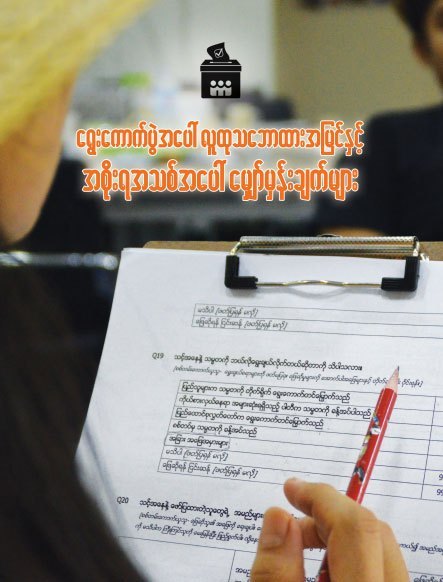Public Opinion on Elections and Expectations of the New Government

Key Findings
Interest in Politics
The majority of people are interested in politics, with 16% saying they are very interested and 42% saying they are somewhat interested. The remainder of respondents said they were not very interested (18%) or not at all interested (15%). A further 9% of respondents said they did not know. Overall, interest in politics has increased since PACE asked the same question one year before in 2015. PACE notes, however, that interest in politics has decreased slightly since the immediate post-election period. During that time, the International Foundation for Electoral Systems (IFES) conducted a survey that reported that a total of 72% of respondents were very or somewhat interested in politics compared with 58% in PACE’s survey conducted four months later.
Citizen Participation
PACE asked respondents if they had attended a community gathering, attended a voter/civic education meeting or signed a petition in the past year. Overall, respondents indicated that they were not very active in these activities, especially in voter/civic education and signing petitions. More than half of respondents had not participated, however the majority said they would if they had the opportunity. In general, citizens show more willingness and interest in the traditional and more common activity of community gathering compared to newer activities like voter education or signing a petition. More than half of citizens said they had never joined a voter or civic education meeting, despite the fact that elections were held last year.
Knowledge about Independent Election Observers and Perception of Their Effectiveness
More than half of respondents (53%) said that they have heard of election observer groups in the 2015 elections. This is a slight increase from PACE’s 2015 pre-election survey, in which 46% of respondents had heard of election observers. Respondents from states were less likely than those in regions to know about election observer groups. Similarly, women were less likely than men to know about election observation groups. When PACE asked about perception of the effectiveness of domestic election observer groups contributing to transparent elections, nearly three quarters of respondents said they thought observers could be helpful, with domestic observers seen as slightly more helpful than international observers.
Trusted Source of Objective Assessment of Election Process
The majority of respondents said they did not know who they could trust to provide an objective assessment of the elections. Notably, less than 5% said they look to observers to provide an objective assessment of the election process. While there was no difference between respondents from states and regions, there is a significant gender gap in the number of women respondents who answered they do not know.
Public Opinions about Need for Reforms in Election Process
When PACE asked respondents if there is “any aspect of the 2015 election process that could be improved in the future?” most respondents believe there is need for improvement, with 40% saying there were aspects that could be improved, 32% saying there were not and 26% saying they didn’t know. Among the respondents who said yes, sixty-one percent (61%) of respondents pointed to the voter list/voter registration as an area for improvement, while 37% noted election day management, 35% said civic and voter education needed improvement, and 29% said electoral fraud needed to be improved. Respondents from urban areas were more likely to say there was a need for reform compared to rural respondents. Women were more likely to say that they did not know if there is need.
Public Understanding about the Method of Electing the President
PACE asked respondents if they know how the President of Myanmar is elected. According to the Constitution of Myanmar, the President is elected by the Pyidaungsu Hluttaw. Only 12% of respondents correctly answered, while 19% said that voters directly selected the President, 17% said that the party who won the most seats appoints the President, and 48% said they did not know. Women were less knowledgeable than men about how the president is elected. There was no change in the percentage of people who could correctly answer how the president is elected between 2016 and 2014, when The Asia Foundation (TAF) asked the same question in its national survey.
Level of Confidence towards Different Institutions
When PACE asked respondents about their level of confidence towards different institutions, the survey results show that religious leaders and the President are the top institutions followed by CSOs/CBOs and Union-level Parliament. If we compare level of confidence of respondents from states and regions, respondents in regions have more confidence towards different institutions than those in states.

